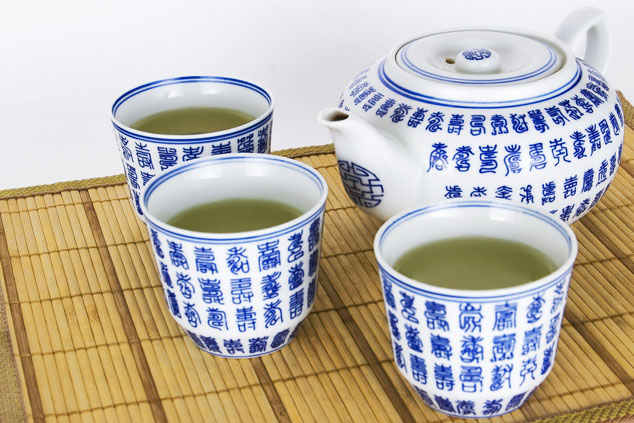 Green tea weight loss depends on how well the key ingredients from tea get into your body. Once there, weight loss is just one of the many health benefits.
Green tea weight loss depends on how well the key ingredients from tea get into your body. Once there, weight loss is just one of the many health benefits.
Green tea is one of the most popular health herbs on Earth. However, its weight loss and other health benefits are minimal unless the right ingredients get to the right places in your body.
That’s where some really cool research shows how to boost its bioavailability and thereby its health benefits, including weight loss.
Green Tea Weight Loss Research
The key research studies I want to call your attention to entail a special patented preparation of green tea extract combined with sunflower seed lecithin. The company behind it calls this phytosome technology.
This preparation was created to enhance the bioavailability of green tea ingredients.
And, boy, does it ever!
Weight loss is one of the benefits of the preparation, called Greenselect Phytosome or Monoselect Camellia, so I’ll start with that one.
As the abstract of the study (Di Pierro et al. 2009) states:
A recently developed oral formulation in the form of coated tablets (Monoselect Camellia) (MonCam) containing highly bioavailable green tea extract (GreenSelect Phytosome) was tested in obese subjects (n=100) of both genders on a hypocaloric diet. Fifty subjects were assigned to the green tea extract plus hypocaloric diet, while the other 50 subjects followed the hypocaloric diet only. After 90 days of treatment, significant weight loss and decreased body mass index (BMI) were observed in the group taking the herbal extract (14-kg loss in the green tea group compared to a 5-kg loss in the diet-only group); waistline was reduced only in male subjects. Besides the effect on weight and BMI, biochemical parameters (LDL-, HDL-, and total cholesterol, triglycerides, growth hormone, insulin-like growth factor-1, insulin, and cortisol) were improved in both groups. Leptin, not tested in the diet-only group, was reduced in patients taking MonCam. Taking into consideration the high safety profile of the product and the total absence of adverse effects observed during and after the trial, MonCam appears to be a safe and effective tool for weight loss.
The main results included improvement in several biochemical markers. However, the key outcome was weight loss, as shown in Table 1 from the study:
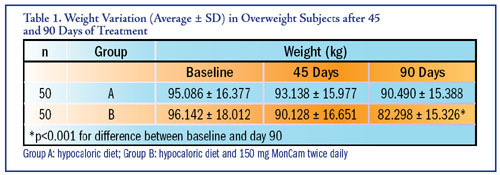
The hypocaloric diet referred to in the abstract and in the table entailed 1,850 Calories per day for men and 1,350 Calories per day for women. Results are expressed in kilograms (kg). A difference of 8.192 kg at 90 days computes to 18 lbs. The difference between control and treatment groups was statistically significant at 90 days, but not statistically significant at 45 days.
The EGCG Dilemma
EGCG (epi-gallocatechin gallate) is the most active ingredient for green tea weight loss and other health benefits. It’s among a handful of substances called catechins.
EGCG is a rather small molecule that has attracted lots of attention in numerous medical studies because of its antioxidant potential. One crucial consideration that most studies miss, though, is how bioavailable it is.
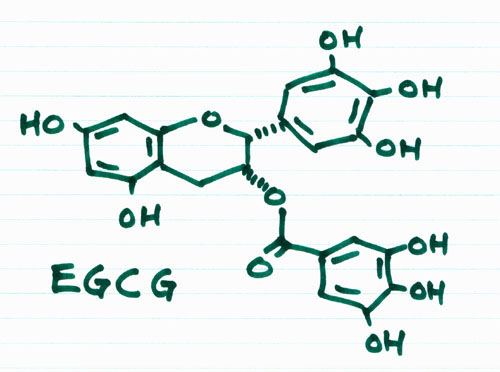
Chemists look at a chemical structure like that and immediately know it’s not very soluble in water. That means it’s hard to absorb in the GI tract.
However, phytosome technology improves its bioavailability, as shown in the following charts:
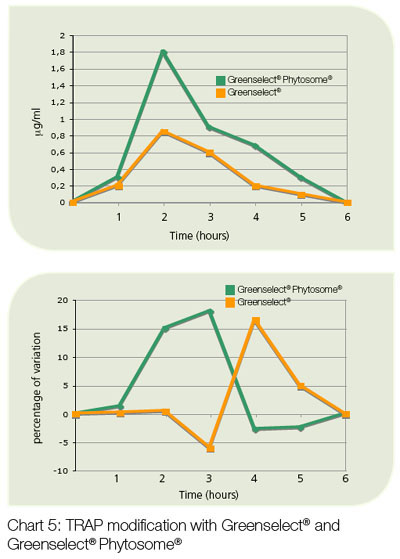
In the first chart, Greenselect Phytosome doubles the amount of available EGCG at its peak (green line). In the second chart, Greenselect Phytosome leads to a quicker antioxidant burst (i.e., TRAP; green line):
The increased bioavailability and faster-acting antioxidant power of the Greenselect Phytosome clearly shows that EGCG can be optimized for its physiological impact when prepared using phytosome technology.
Bonus Benefits with Green Tea Weight Loss
Based on prior research on green tea, particularly on EGCG, we can expect certain biochemistry to improve, such as total cholesterol (TC), fasting blood sugar (BS), and total triglycerides (TT), as shown in Table 3:
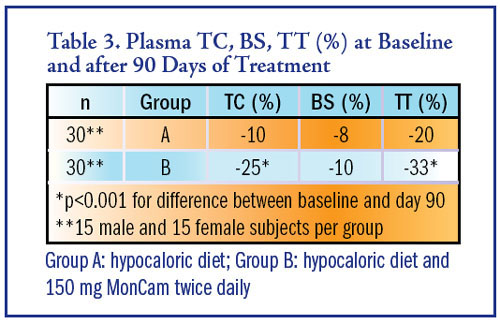
And Some Nice Surprises
Researchers already expected those improvements.
However, they also found some unexpected surprises, which are summarized in the following table:
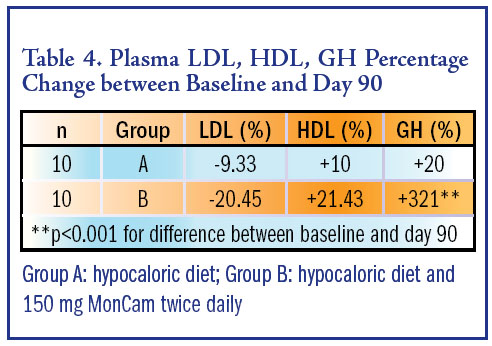
The biggest unexpected bonus was the incredible 321% increase in levels of human growth hormone (hGH).
Othere hormones intimately intertwined with hGH include insulin-like growth factor 1 (IGF-1) and insulin. They are both protein hormones.
Both are also boosted by green tea phytosome, as follows:
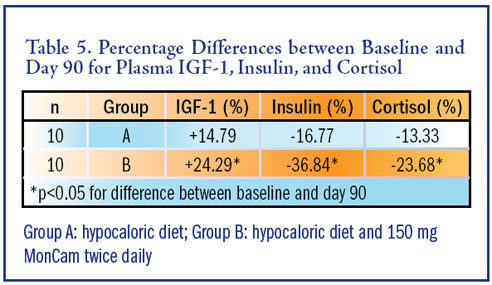
IGF-1 is a more reliable indicator of hGH activity, since hGH levels spike several times per day and its cohort, IGF-1, does not.
However spectacular the rise in hGH seems, it may mean very little because hGH is so ‘spikey’. However, the 24% increase in IGF-1 is truly something to get excited about.
Note also that a reduced calorie diet by itself even led to a 15 percent increase in this hormone. That observation alone should tell you that eating too much is probably harmful to proper hormone balance. It suggests a link to the already established knowledge about wild hormone imbalances in the obese.
Finally, the change in cortisol levels reflects the beneficial influence of EGCG on steroid metabolism.
Products Containing Greenselect Phytosome
Since phytosome technology is patented, supplement manufacturers must have a license to include it in green tea products. One of the first manufacturers to offer such a product was Thorne Research, which produces supplements for health care professionals.
In my opinion, it’s still the best oral preparation of green tea extract on the market.
Comments or Questions?
I’d love to hear from you. This and every other post here provides a comment section at the end of the post, exactly for that purpose.
So, by all means, leave me your thoughts.
I would be especially grateful if you point out any flaws in my logic, factual errors, or ordinary typos. (I’ll give you a little ‘huzzah’ in my heart.)
Then I’ll respond as soon as I can.
References
Barani M, Sangiovanni E, Angarano M, Rajizadeh MA, Mehrabani M, Piazza S, Gangadharappa HV, Pardakhty A, Mehrbani M, Dell’Agli M, Nematollahi MH. Phytosomes as Innovative Delivery Systems for Phytochemicals: A Comprehensive Review of Literature. Int J Nanomedicine. 2021 Oct 15;16:6983-7022. doi: 10.2147/IJN.S318416. PMID: 34703224; PMCID: PMC8527653. https://www.ncbi.nlm.nih.gov/pmc/articles/PMC8527653/
Basu A, Sanchez K, Leyva MJ, Wu M, Betts NM, Aston CE, Lyons TJ. Green tea supplementation affects body weight, lipids, and lipid peroxidation in obese subjects with metabolic syndrome. J Am Coll Nutr. 2010 Feb;29(1):31-40. doi: 10.1080/07315724.2010.10719814. PMID: 20595643. https://pubmed.ncbi.nlm.nih.gov/20595643/
Chen IJ, Liu CY, Chiu JP, Hsu CH. Therapeutic effect of high-dose green tea extract on weight reduction: A randomized, double-blind, placebo-controlled clinical trial. Clin Nutr. 2016 Jun;35(3):592-9. doi: 10.1016/j.clnu.2015.05.003. Epub 2015 May 29. PMID: 26093535. https://pubmed.ncbi.nlm.nih.gov/26093535/
Di Pierro F, Menghi AB, Barreca A, Lucarelli M, Calandrelli A. Greenselect Phytosome as an adjunct to a low-calorie diet for treatment of obesity: a clinical trial. Altern Med Rev. 2009 Jun;14(2):154-60. PMID: 19594224. https://pubmed.ncbi.nlm.nih.gov/19594224/
Gilardini L, Pasqualinotto L, Di Pierro F, Risso P, Invitti C. Effects of Greenselect Phytosome® on weight maintenance after weight loss in obese women: a randomized placebo-controlled study. BMC Complement Altern Med. 2016 Jul 22;16:233. doi: 10.1186/s12906-016-1214-x. PMID: 27450231; PMCID: PMC4957378. https://www.ncbi.nlm.nih.gov/pmc/articles/PMC4957378/
Pietta PG, Simonetti P, Gardana C, Brusamolino A, Morazzoni P, Bombardelli E. Catechin metabolites after intake of green tea infusions. Biofactors. 1998;8(1-2):111-8. doi: 10.1002/biof.5520080119. PMID: 9699018. https://pubmed.ncbi.nlm.nih.gov/9699018/
Pietta P, Simonetti P, Gardana C, Brusamolino A, Morazzoni P, Bombardelli E. Relationship between rate and extent of catechin absorption and plasma antioxidant status. Biochem Mol Biol Int. 1998 Dec;46(5):895-903. doi: 10.1080/15216549800204442. PMID: 9861443. https://pubmed.ncbi.nlm.nih.gov/9861443/
Rondanelli M, Gasparri C, Perna S, Petrangolini G, Allegrini P, Fazia T, Bernardinelli L, Cavioni A, Mansueto F, Oberto L, Patelli Z, Tartara A, Riva A. A 60-Day Green Tea Extract Supplementation Counteracts the Dysfunction of Adipose Tissue in Overweight Post-Menopausal and Class I Obese Women. Nutrients. 2022 Dec 7;14(24):5209. doi: 10.3390/nu14245209. PMID: 36558368; PMCID: PMC9785698. https://www.ncbi.nlm.nih.gov/pmc/articles/PMC9785698/
All the best in natural health,
![]()
Statements on this page have not been evaluated by the Food and Drug Administration. Information here is not is not intended to diagnose, treat, cure, or prevent any disease.
I may receive a commission for purchases made through those links.
This doesn’t change the cost to you.
Leave a Reply